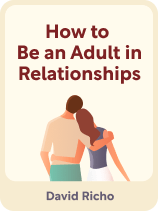

This article is an excerpt from the Shortform book guide to "How to Be an Adult in Relationships" by David Richo. Shortform has the world's best summaries and analyses of books you should be reading.
Like this article? Sign up for a free trial here.
How should a relationship push you to be a better person? What are the benefits of practicing mindfulness in relationships?
In How to Be an Adult in Relationships, David Richo says that mindfulness creates relationships that are not only strong but also continue to help you heal and mature. Also, mindful love helps you navigate the changes that occur naturally over the course of a relationship.
Discover how mindfulness can improve your relationships so you and your relationship can grow.
1. Mindfully Loving Relationships Encourage You to Grow
Richo says that mindfulness in relationships encourages psychological growth in three ways: It provides the opportunity to process your issues, makes compassionate validation possible, and improves your self-esteem.
Relationships Provide Opportunities for Processing
Mindfully loving relationships are a space where you can explore and overcome the consequences of your childhood wounds. Richo explains that during the course of a relationship, you and your partner will inevitably trigger old memories of emotional pain. When this happens between two mindful adults, you can healthily address the conflict and the inner turmoil that has followed you from childhood into adulthood.
For example, if your partner snaps at you because the house is a mess, you might be upset—not just because your partner snapped at you, but also because it reminds you of all the times your parents snapped at you as a kid. If you’re both mindfully loving, you can process and work through it: You tell your partner how it makes you feel when they snap at you, and they validate your feelings. Then, together, you figure out healthier ways to deal with conflict in the future.
Relationships Provide Compassionate Support
Richo says that in addition to helping you work through your childhood wounds, your partner can support you through your adult wounds. For example, if you feel hurt after the end of a friendship, your partner might invite you to express that pain and make an effort to show you some extra affection when you need it. Compassionate validation from your partner ensures that you don’t feel alone and overwhelmed in your pain—instead, you feel connected and supported, which makes pain more tolerable.
Relationships Improve Your Self-Esteem
Intimate relationships also improve your self-esteem because when someone shows a romantic interest in you, it proves to you that you’re lovable. And, as the relationship deepens, you reveal your flaws and weaknesses, and you continue receiving your partner’s love, you’ll affirm that you’re worthy of love regardless of your imperfections.
2. Mindful Loving Helps Your Relationship Withstand Change
In addition to supporting your healthy changes, mindful loving helps you withstand changes. Richo argues that all successful relationships happen in three phases—the honeymoon phase, the discordant phase, and the devotion phase. Mindful loving enables you to navigate and transition between these phases and transition between them in a way that makes your relationship stronger.
Mindful Loving in the Honeymoon Phase
In the honeymoon phase, romance is at a high and you express mindful love easily. You act like the best version of yourself, and so does your partner, so you’re both swept away by the illusion that your partner is perfect or nearly perfect. As a result, it’s easy for you and your partner to practice Gratitude, Respect, Engagement, Attention, and Tenderness (GREAT) with each other and affirm one another’s inherent lovability. This helps you build a mutually loving foundation upon which the rest of the relationship can rest.
Mindful Loving in the Discordant Phase
Richo says that you and your partner will inevitably leave the honeymoon stage and enter the discordant phase when you begin to have conflict with each other. In this stage, you’ll see each other as flawed for the first time.
According to Richo, conflict can be resolved more easily and strengthen your relationship if you approach it in a mindfully loving way: as an opportunity to get to know and accept each other more fully.
To resolve conflicts in a mindfully loving way, Rico says you have to put your ego aside and focus on cooperating with your partner instead of on winning the argument. More specifically, you and your partner should listen to and validate each other’s feelings about the conflict, practicing each of the five components of the GREAT model all the while.
Mindful Loving in the Devotion Phase
In the devotion phase, you commit to maintaining a healthy relationship and loving each other fully—imperfections and all. According to Richo, mindful loving is key to the devotion phase because it helps you give each other the grace you’ll need to stay together through life changes. There will be times in each of your lives when you need to receive more love than you’re capable of giving. For example, if you become seriously ill, you’ll be more reliant on your partner’s support, and you won’t have the energy to return the same amount of support.
If you want your relationship to last, you’ll both need to keep in mind that your partner is still deserving of your love even when they’re not at their best.
3. Mindful Loving Helps You End Relationships Gracefully
According to Richo, mindful loving helps you recognize when it’s time to end a relationship. He says that it’s time to break up when the relationship is no longer viable because the seriousness of your issues surpasses your or your partner’s ability to deal with them—continuing the relationship would hurt you or your partner.

———End of Preview———
Like what you just read? Read the rest of the world's best book summary and analysis of David Richo's "How to Be an Adult in Relationships" at Shortform.
Here's what you'll find in our full How to Be an Adult in Relationships summary:
- The secret to a long-lasting, loving relationship
- How to overcome emotional wounds that hold you back from loving
- How the Buddhist concept of mindful loving can create a better world






